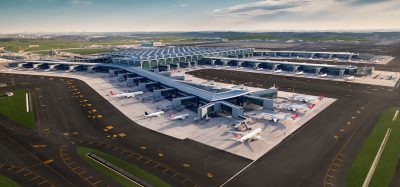Safe guarding the integrity of Bahrain’s BHS
- Like
- Digg
- Del
- Tumblr
- VKontakte
- Buffer
- Love This
- Odnoklassniki
- Meneame
- Blogger
- Amazon
- Yahoo Mail
- Gmail
- AOL
- Newsvine
- HackerNews
- Evernote
- MySpace
- Mail.ru
- Viadeo
- Line
- Comments
- Yummly
- SMS
- Viber
- Telegram
- Subscribe
- Skype
- Facebook Messenger
- Kakao
- LiveJournal
- Yammer
- Edgar
- Fintel
- Mix
- Instapaper
- Copy Link
Posted: 6 March 2020 | Bahrain Airport Company | No comments yet
On 1 October 2019, new Baggage Acceptance Rules were introduced at Bahrain International Airport to prevent system disruption. We spoke to Bahrain Airport Company regarding how these will alter both the passenger experience and terminal procedure.


What are the new baggage rules that were introduced in October?
We identified three types of checked baggage that can compromise the integrity of the baggage handling system (BHS): Round bags, blanket-wrapped bags tied with rope, and baggage with long or loose straps. Accordingly, these items will no longer be permitted. Normal out of gauge (OOG), bulky and fragile items, including sports equipment, wheelchairs and baby strollers will still be checked in via the OOG facility.
These new guidelines are a result of extensive studies and are in line with baggage acceptance regulations at airports around the world. The new rules will also help eliminate jams in the BHS that cause shutdowns and delays, and inconvenience to passengers and airlines. The baggage rules will allow the airport to achieve the highest level of performance and deliver a quality baggage service to all passengers.
How does the new baggage system compare to the previous procedures?
The current process at Bahrain International Airport allows for any bag within the IATA size guidelines to be checked in, irrespective of shape. The majority of airlines have their own policies and procedures to manage irregular shaped items. However, these policies focus more on loading items into the aircraft hold based on space and weight. As the airport’s operator and managing body, we have a responsibility for the complete journey of passengers’ luggage from check in to aircraft loading and offloading.
How will the new guidelines affect the passenger experience?
The new Baggage Acceptance Rules are being implemented to improve the overall passenger experience. Passengers arriving at the airport with luggage that does not meet the new acceptance criteria will have the option to repack their belongings into a box offered at the departure area. Our main objective with this initiative is to protect the BHS and, in turn, enhance customer satisfaction. These new rules will ensure that any luggage items that could potentially cause jams and breakdowns are intercepted before they are checked in.
Does using automated systems at Bahrain International Airport make operations easier?
High-end baggage systems support the uninterrupted journey of passengers’ baggage from check in to the flight-build area in the baggage hall. Modern BHS are more intelligent than ever, allowing airport operators to track, trace and transport baggage based on information provided on the baggage tag. All automated processes are overseen, managed and controlled via a 24/7 manned control room.
The Baggage Acceptance Rules cover check in of local baggage, but will arriving luggage disrupt this process?
We are encouraging all passengers arriving, departing or transiting through Bahrain International Airport to adhere to these rules. Arrival and transfer passengers are informed about these important regulations via pamphlets, media and other signage. At this point, they are not presented with a complimentary box. At the current terminal, we facilitate the transfer of luggage remotely, meaning all transfer baggage offloaded from flights is sent to the two facilities located on the eastern side of the apron and another facility located on the western side of the apron.
These facilities have direct feeding lines with no sortation or complex baggage systems. At these locations we are able to process large and non-compliant items. The arrival in-feed consists of a short in-feed line, screening and out-feed onto the collecting carousel, which again allows for non-compliant items to be offloaded without any disruption to the system.
However, looking forward to the advanced system we will be utilising in the new passenger terminal building, these types of bags will either be placed in a baggage tub or screened through a standalone facility. We will not be able to feed them directly into the BHS. Communications about the roll out of the baggage acceptance rules have been sent to all airlines to share with their network.
What happens when passengers arrive at the airport with baggage that is non-compliant under the new baggage acceptance rules?
As the operator and managing body of Bahrain International Airport, we pride ourselves on delivering a seamless journey to all passengers and their luggage. Accordingly, we are striving to support and assist airlines and passengers during the transition to the new baggage rules.
To ensure we lived up to this promise, we took the initiative to hand out free boxes, for a period of one month, to all passengers arriving with baggage items that were non-compliant or not accepted at check in. There were two dedicated repackaging facilitates erected for this purpose where baggage porters assisted each passenger to repack and seal their items into a BAC-branded cardboard box.
This initiative continued until the end of October, following which a small fee is now charged for the service. We have made every effort to ensure that all passengers are aware of the new rules ahead of time, giving them plenty of time to prepare themselves so they can avoid disappointment when arriving at the airport.
Who will be in charge of managing the BHS?
The BHS at BIA will be managed and overseen by a newly established team, which is comprised of mainly Bahraini staff and a limited number of expatriates who are on hand to offer additional support.
The team has undergone in-depth training to familiarise themselves with the new, state-of-the-art baggage system at the new terminal ahead of its opening. Alongside the Operational Readiness Airport Transfer (ORAT) team, the BHS team will shortly be participating in crucial trials which will see the entire airport undergo extensive testing. Once these tests are completed, the BHS team will take control of the new baggage system when the new airport opens in the first quarter of 2020.


















